Unit 5 International Charities Grammar
文档属性
| 名称 | Unit 5 International Charities Grammar |
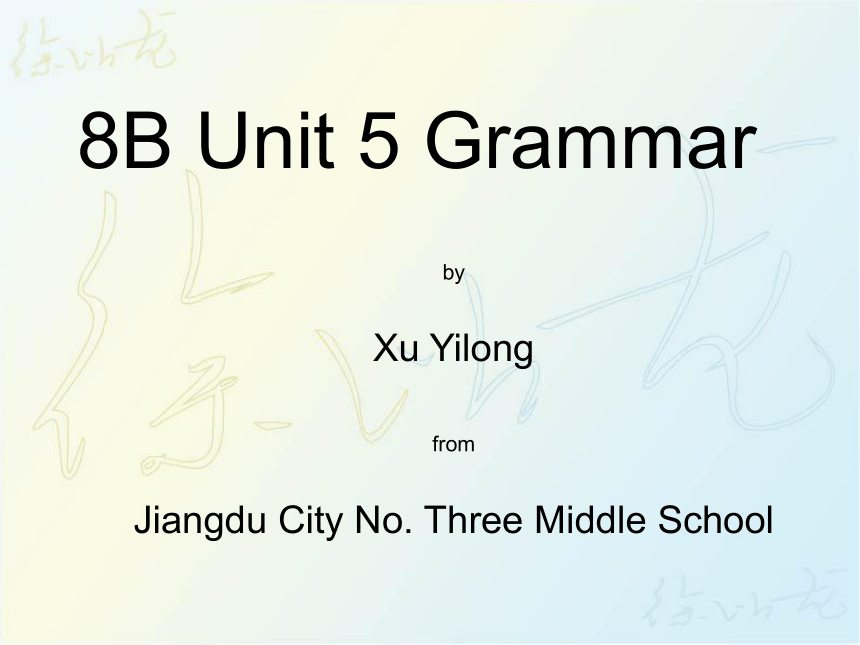
|
|
| 格式 | rar | ||
| 文件大小 | 33.2KB | ||
| 资源类型 | 教案 | ||
| 版本资源 | 牛津译林版 | ||
| 科目 | 英语 | ||
| 更新时间 | 2011-03-30 00:00:00 | ||
图片预览


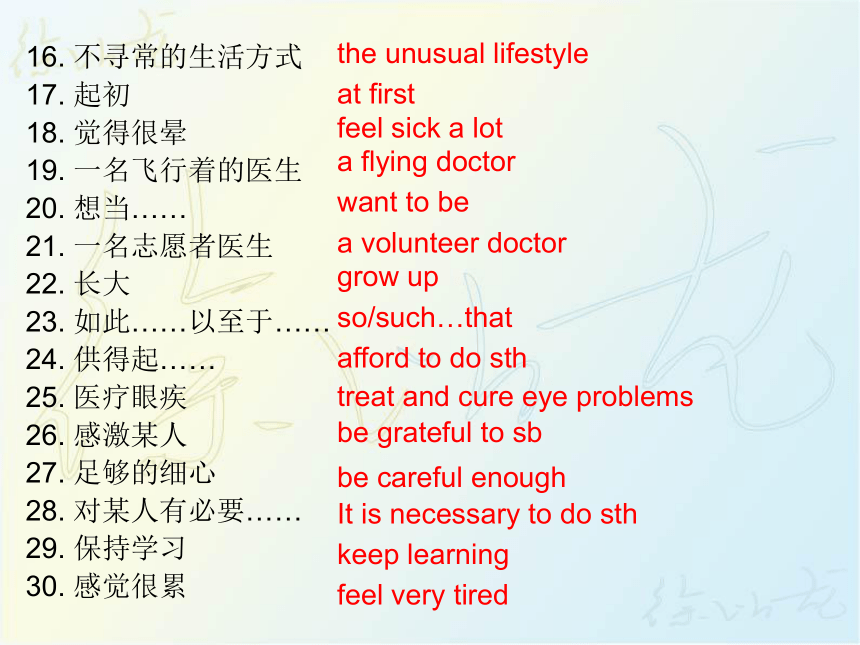
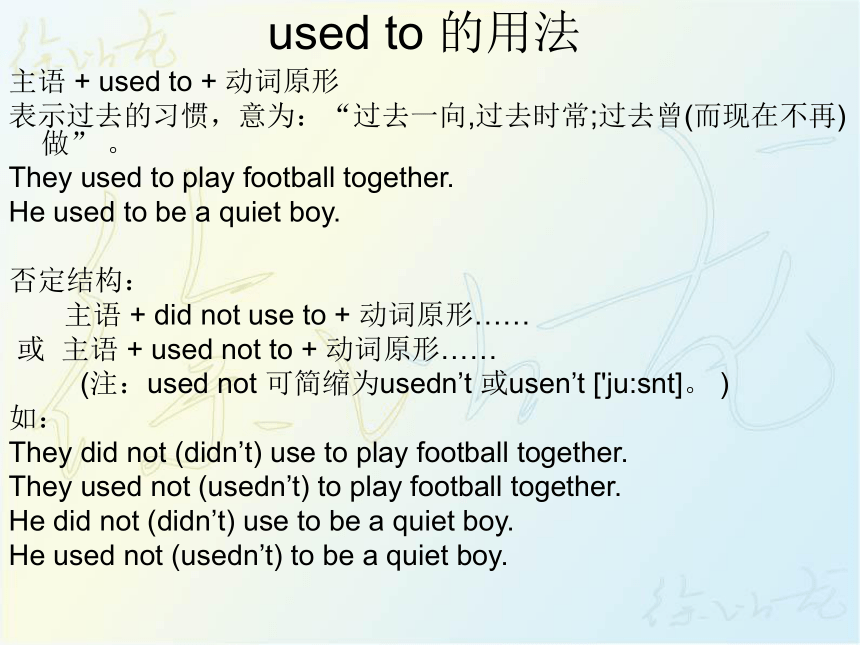

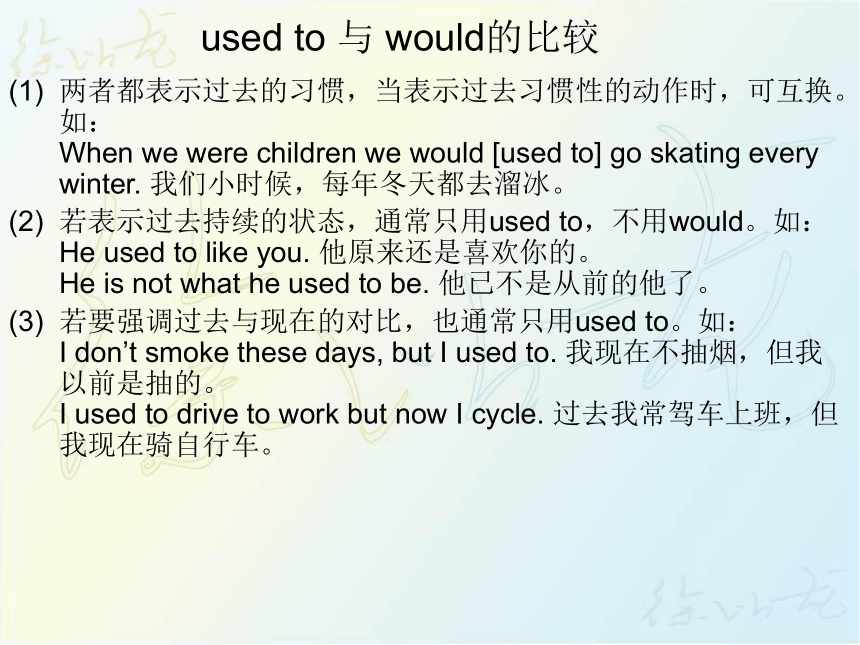
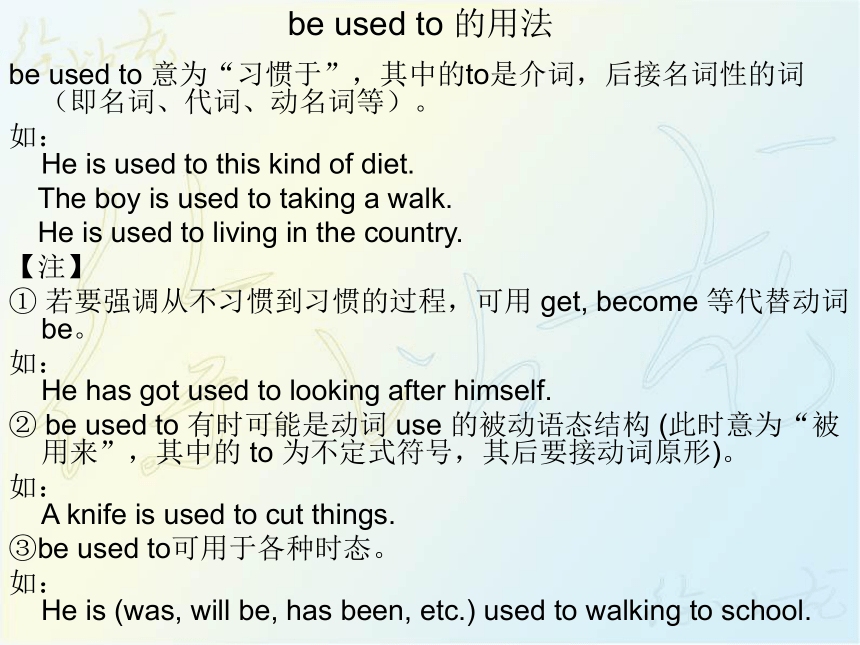
文档简介
课件15张PPT。8B Unit 5 Grammarby
Xu Yilong
from
Jiangdu City No. Three Middle School翻译下列词组和句子。 1. (过去)经常做某事
2. 谈论……
3. 在医院里
4. 失明
5. 吃早饭
6. 给……做手术
7. 花时间做某事
8. 在奥比斯飞机上
9. 给……治疗眼疾
10. 如以往的收入
11. 更有意义
12. 习惯于……
13. 炎热的天气
14. 离家老远
15. 工作时间
used to do sthin the hospitaltalk aboutspend time on stheat breakfastbe blindtreat sb for one’s eye problemsoperate on on the ORBIS planebe more meaningfulbe used to …have as much money as beforeworking hoursthe hot weatherfar away from home16. 不寻常的生活方式
17. 起初
18. 觉得很晕
19. 一名飞行着的医生
20. 想当……
21. 一名志愿者医生
22. 长大
23. 如此……以至于……
24. 供得起……
25. 医疗眼疾
26. 感激某人
27. 足够的细心
28. 对某人有必要……
29. 保持学习
30. 感觉很累
the unusual lifestyleat firstfeel sick a lota flying doctorwant to bea volunteer doctorgrow upso/such…thatafford to do sthtreat and cure eye problemsbe grateful to sbbe careful enoughIt is necessary to do sthkeep learningfeel very tiredused to 的用法主语 + used to + 动词原形
表示过去的习惯,意为:“过去一向,过去时常;过去曾(而现在不再)做” 。
They used to play football together.
He used to be a quiet boy.
否定结构:
主语 + did not use to + 动词原形……
或 主语 + used not to + 动词原形……
(注:used not 可简缩为usedn’t 或usen’t ['ju:snt]。 )
如:
They did not (didn’t) use to play football together.
They used not (usedn’t) to play football together.
He did not (didn’t) use to be a quiet boy.
He used not (usedn’t) to be a quiet boy.
疑问句结构:
Did + 主语 + use to +动词原形……?
(Yes, sb did. //No, sb didn’t.)
或 Used + 主语 + to +动词原形……?
(Yes, sb used to. // No, sb usedn’t to. 注意其中的to不可省略)
如:
Did they use to play football together?
(Yes, they did. // No, they didn’t.)
Used they to play football together?
(Yes, they used to. // No, they usedn’t to.)
Did he use to be a quiet boy?
(Yes, he did. // No, he didn’t.)
Used he to be a quiet boy?
(Yes, he used to. // No, he usedn’t to.)
This house used to be a bookshop, didn’t/usedn’t it?
He didn’t use to drink, did he?
used to 与 would的比较两者都表示过去的习惯,当表示过去习惯性的动作时,可互换。如: When we were children we would [used to] go skating every winter. 我们小时候,每年冬天都去溜冰。
若表示过去持续的状态,通常只用used to,不用would。如: He used to like you. 他原来还是喜欢你的。 He is not what he used to be. 他已不是从前的他了。
若要强调过去与现在的对比,也通常只用used to。如: I don’t smoke these days, but I used to. 我现在不抽烟,但我以前是抽的。 I used to drive to work but now I cycle. 过去我常驾车上班,但我现在骑自行车。be?used?to 的用法be used to 意为“习惯于”,其中的to是介词,后接名词性的词(即名词、代词、动名词等)。
如: He is used to this kind of diet.
The boy is used to taking a walk.
He is used to living in the country.
【注】
① 若要强调从不习惯到习惯的过程,可用 get, become 等代替动词 be。
如: He has got used to looking after himself.
② be used to 有时可能是动词 use 的被动语态结构 (此时意为“被用来”,其中的 to 为不定式符号,其后要接动词原形)。
如: A knife is used to cut things.
③be?used?to可用于各种时态。
如: He?is?(was,?will?be,?has?been,?etc.)?used?to?walking?to?school. 根据句意选择used to或be used填空 1. My father _______________ work in the police station here.
2. His grandparents _________________ living in the country.
3. They ______________ go out with their friends at weekends.
4. I ________________ my life now because it’s meaningful.
5. She ________________ working at weekends.
6. He ______________ be blind and _______________living in the darkness in the past.are used toused toused toam used tois used toused towas used to so与such区别:① so是副词,后跟形容词或副词。 such是形容词,后跟名词短语。
so + adj. such + a(n) + n. ? so + adj. + a(n) + n. such + n. (pl.) ? so + adj. + n. (pl.) such +n. (pl.) ? so + adj. + n. [不可数] such +n. [不可数]
so + adv.
?如:
The man is so foolish.
He is such a fool. ?
It is so nice a flower.
It is such a nice flower. ?
You have such nice flowers. ?
The old man walks so slowly / carefully .
②若名词前形容词是many, much, few, little时,不用such, 而用so.
如:
You have so many/ few flowers.
We have so much/little money. ③ 其实so many 已成固定搭配,而a lot of 虽相当于 many,但 a lot of 为名词性的,只能用such搭配。
如: ?
There are such a lot of people in the street.
There are so many people on the square.
so … that 与 such … that
so…that与such…that之间的差别,其实为 so与such之间的差别。
如:
The child is so lovely that everyone likes him.
She is such a lovely girl that everyone likes her.
He is so clever that he answers the questions so quickly.
He is such a clever boy that he answers the questions in such a short time.根据句意选择so或such填空 1. He is ________ a foolish boy that he makes the same mistake again and again.
2. The exercise is ________ difficult that we can’t work it out by ourselves.
3. There were ________many people in the street that we could only walk slowly that day.
4. The boy ran ________ fast that he caught up with his classmates very soon.
5. It is ________ an interesting story that the children want to listen to it once more.
6. There was ________ much noise in the room that we didn’t want to stay in it.suchsososososuchso … that 与too … to及enough to 的转换The car ran so fast that it could catch up with the train.
The car ran fast enough to catch up with the train.
The man was so angry that he couldn’t say a word.
The man was too angry to say a word.
The boy is so young that he can’t go to school.
The boy is too young to go to school.
The boy is not old enough to go to school.
The exercises are so difficult that we can’t work them out.
The exercises are too difficult for us to work out.
The exercises are not easy enough for us to work out.
Your voice was so low that I couldn’t hear you clearly.
Your voice was too low for me to hear you clearly.
Your voice wasn’t loud enough for me to hear you clearly.将下列句子译成英语。他过去上学常常迟到,但现在习惯早起了。
2. 妈妈习惯在晚上收拾屋子,可以前她常在周末收拾的。
3. 她父母没那么多的钱,她不能立刻住院治疗。
4. 雨下得那么大,他们看不清前面的路了。
He used to be late for school, but he is used to getting up early now.Mum is used to cleaning the house in the evening, but she used to clean it at weekend.Her mother didn’t have so much money that she couldn’t be in hospital at once.It was raining so hard that they couldn’t see the road ahead clearly.5. 这种工具是用来开瓶子的。
6. 史密斯先生现在习惯说汉语了。
7. 那个老人习惯了乡村的生活,他不想和他的儿子一起生活在城市里。
8. 以前他们经常去那个公园锻炼,那儿的人都认识他们了。
This kind of tool is used to open bottles.Mr Smith is used to speaking Chinese now.The old man is used to the life in the country, he doesn’t want to live with his son in the city.They used to take exercise in the park so often that the people there all know them . Thank you.
Goodbye!
Xu Yilong
from
Jiangdu City No. Three Middle School翻译下列词组和句子。 1. (过去)经常做某事
2. 谈论……
3. 在医院里
4. 失明
5. 吃早饭
6. 给……做手术
7. 花时间做某事
8. 在奥比斯飞机上
9. 给……治疗眼疾
10. 如以往的收入
11. 更有意义
12. 习惯于……
13. 炎热的天气
14. 离家老远
15. 工作时间
used to do sthin the hospitaltalk aboutspend time on stheat breakfastbe blindtreat sb for one’s eye problemsoperate on on the ORBIS planebe more meaningfulbe used to …have as much money as beforeworking hoursthe hot weatherfar away from home16. 不寻常的生活方式
17. 起初
18. 觉得很晕
19. 一名飞行着的医生
20. 想当……
21. 一名志愿者医生
22. 长大
23. 如此……以至于……
24. 供得起……
25. 医疗眼疾
26. 感激某人
27. 足够的细心
28. 对某人有必要……
29. 保持学习
30. 感觉很累
the unusual lifestyleat firstfeel sick a lota flying doctorwant to bea volunteer doctorgrow upso/such…thatafford to do sthtreat and cure eye problemsbe grateful to sbbe careful enoughIt is necessary to do sthkeep learningfeel very tiredused to 的用法主语 + used to + 动词原形
表示过去的习惯,意为:“过去一向,过去时常;过去曾(而现在不再)做” 。
They used to play football together.
He used to be a quiet boy.
否定结构:
主语 + did not use to + 动词原形……
或 主语 + used not to + 动词原形……
(注:used not 可简缩为usedn’t 或usen’t ['ju:snt]。 )
如:
They did not (didn’t) use to play football together.
They used not (usedn’t) to play football together.
He did not (didn’t) use to be a quiet boy.
He used not (usedn’t) to be a quiet boy.
疑问句结构:
Did + 主语 + use to +动词原形……?
(Yes, sb did. //No, sb didn’t.)
或 Used + 主语 + to +动词原形……?
(Yes, sb used to. // No, sb usedn’t to. 注意其中的to不可省略)
如:
Did they use to play football together?
(Yes, they did. // No, they didn’t.)
Used they to play football together?
(Yes, they used to. // No, they usedn’t to.)
Did he use to be a quiet boy?
(Yes, he did. // No, he didn’t.)
Used he to be a quiet boy?
(Yes, he used to. // No, he usedn’t to.)
This house used to be a bookshop, didn’t/usedn’t it?
He didn’t use to drink, did he?
used to 与 would的比较两者都表示过去的习惯,当表示过去习惯性的动作时,可互换。如: When we were children we would [used to] go skating every winter. 我们小时候,每年冬天都去溜冰。
若表示过去持续的状态,通常只用used to,不用would。如: He used to like you. 他原来还是喜欢你的。 He is not what he used to be. 他已不是从前的他了。
若要强调过去与现在的对比,也通常只用used to。如: I don’t smoke these days, but I used to. 我现在不抽烟,但我以前是抽的。 I used to drive to work but now I cycle. 过去我常驾车上班,但我现在骑自行车。be?used?to 的用法be used to 意为“习惯于”,其中的to是介词,后接名词性的词(即名词、代词、动名词等)。
如: He is used to this kind of diet.
The boy is used to taking a walk.
He is used to living in the country.
【注】
① 若要强调从不习惯到习惯的过程,可用 get, become 等代替动词 be。
如: He has got used to looking after himself.
② be used to 有时可能是动词 use 的被动语态结构 (此时意为“被用来”,其中的 to 为不定式符号,其后要接动词原形)。
如: A knife is used to cut things.
③be?used?to可用于各种时态。
如: He?is?(was,?will?be,?has?been,?etc.)?used?to?walking?to?school. 根据句意选择used to或be used填空 1. My father _______________ work in the police station here.
2. His grandparents _________________ living in the country.
3. They ______________ go out with their friends at weekends.
4. I ________________ my life now because it’s meaningful.
5. She ________________ working at weekends.
6. He ______________ be blind and _______________living in the darkness in the past.are used toused toused toam used tois used toused towas used to so与such区别:① so是副词,后跟形容词或副词。 such是形容词,后跟名词短语。
so + adj. such + a(n) + n. ? so + adj. + a(n) + n. such + n. (pl.) ? so + adj. + n. (pl.) such +n. (pl.) ? so + adj. + n. [不可数] such +n. [不可数]
so + adv.
?如:
The man is so foolish.
He is such a fool. ?
It is so nice a flower.
It is such a nice flower. ?
You have such nice flowers. ?
The old man walks so slowly / carefully .
②若名词前形容词是many, much, few, little时,不用such, 而用so.
如:
You have so many/ few flowers.
We have so much/little money. ③ 其实so many 已成固定搭配,而a lot of 虽相当于 many,但 a lot of 为名词性的,只能用such搭配。
如: ?
There are such a lot of people in the street.
There are so many people on the square.
so … that 与 such … that
so…that与such…that之间的差别,其实为 so与such之间的差别。
如:
The child is so lovely that everyone likes him.
She is such a lovely girl that everyone likes her.
He is so clever that he answers the questions so quickly.
He is such a clever boy that he answers the questions in such a short time.根据句意选择so或such填空 1. He is ________ a foolish boy that he makes the same mistake again and again.
2. The exercise is ________ difficult that we can’t work it out by ourselves.
3. There were ________many people in the street that we could only walk slowly that day.
4. The boy ran ________ fast that he caught up with his classmates very soon.
5. It is ________ an interesting story that the children want to listen to it once more.
6. There was ________ much noise in the room that we didn’t want to stay in it.suchsososososuchso … that 与too … to及enough to 的转换The car ran so fast that it could catch up with the train.
The car ran fast enough to catch up with the train.
The man was so angry that he couldn’t say a word.
The man was too angry to say a word.
The boy is so young that he can’t go to school.
The boy is too young to go to school.
The boy is not old enough to go to school.
The exercises are so difficult that we can’t work them out.
The exercises are too difficult for us to work out.
The exercises are not easy enough for us to work out.
Your voice was so low that I couldn’t hear you clearly.
Your voice was too low for me to hear you clearly.
Your voice wasn’t loud enough for me to hear you clearly.将下列句子译成英语。他过去上学常常迟到,但现在习惯早起了。
2. 妈妈习惯在晚上收拾屋子,可以前她常在周末收拾的。
3. 她父母没那么多的钱,她不能立刻住院治疗。
4. 雨下得那么大,他们看不清前面的路了。
He used to be late for school, but he is used to getting up early now.Mum is used to cleaning the house in the evening, but she used to clean it at weekend.Her mother didn’t have so much money that she couldn’t be in hospital at once.It was raining so hard that they couldn’t see the road ahead clearly.5. 这种工具是用来开瓶子的。
6. 史密斯先生现在习惯说汉语了。
7. 那个老人习惯了乡村的生活,他不想和他的儿子一起生活在城市里。
8. 以前他们经常去那个公园锻炼,那儿的人都认识他们了。
This kind of tool is used to open bottles.Mr Smith is used to speaking Chinese now.The old man is used to the life in the country, he doesn’t want to live with his son in the city.They used to take exercise in the park so often that the people there all know them . Thank you.
Goodbye!
